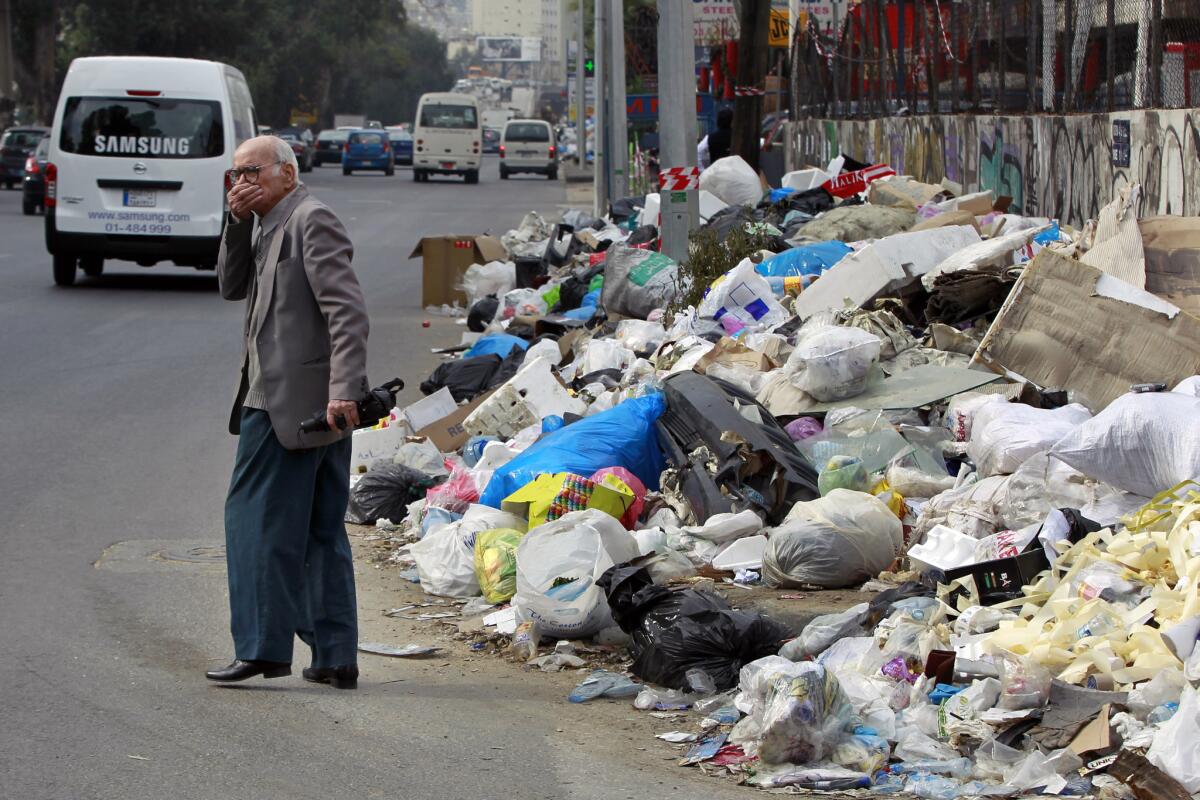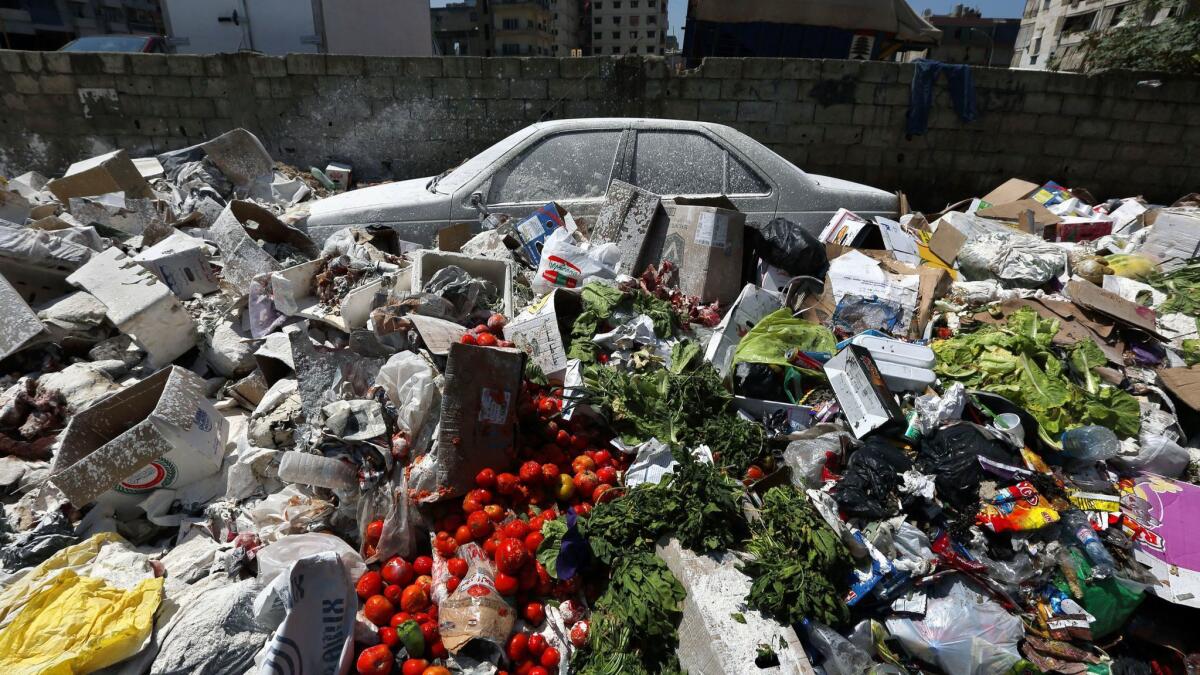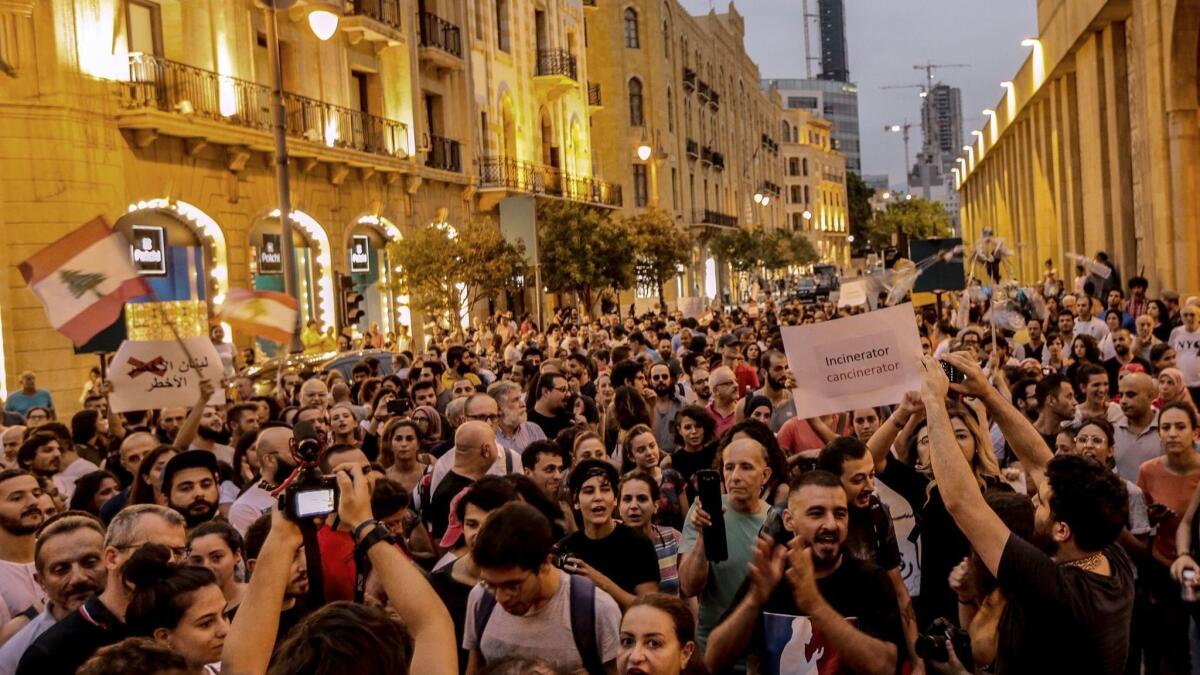As Lebanon drowns in its own trash, people look to themselves â not the government â for solutions

Lebanonâs waste crisis is a three-year tale of tragicomic ineptitude that has enraged the nation and brought people to the streets in anger as the mounds of trash have grown and the stench of tainted water worsened. Hereâs an up-close look at the me
Reporting from Beirut â The trash blankets the beach in Beirut, rubbish is pushed into the sea by the ton, and the smoke from the heaps of burning garbage washes across Lebanonâs countryside.
Little has fazed the Lebanese since the civil war ended here in 1990. Intermittent electricity and water. Dismal telecommunications at extortionate prices. An exasperating government perpetually in gridlock. All are accepted as routine.
Yet itâs Lebanonâs waste crisis, a three-year tale of tragicomic ineptitude, that has enraged the nation and brought people to the streets in anger. It has become shorthand for the incompetence many see as endemic in the stateâs laissez-faire form of governance, and the political class behind it.
It has also raked up questions about the sense of shared destiny among Lebanonâs 18 sects, and what it means to be a Lebanese citizen under a government many no longer trust.
Some speak wistfully of antebellum Lebanon and share nostalgic images on social media of the chic, Riviera-on-the-Med glamour of the countryâs beaches, with majestic snow-capped mountains in the background.
Those same beaches and mountains are now strewn with garbage.

The trash crisisâ roots can be traced back decades, but it first made headlines in 2015 after residents in the village of Naameh blocked the road to a nearby landfill to stop the trash from being hauled in.
The site had been opened in 1997 and was meant to last for just seven years. Eighteen years and 15 million tons of trash later â13 million more than it was supposed to hold â the landfill was closed.
But the government hadnât prepared an alternative site. Sukleen, the contractor that picked up waste in the capital and its environs, simply stopped doing so. Hills of trash, sprinkled with white pesticide powder to control the rats, cropped up like out-of-season Christmas displays on Beirutâs sweltering streets.
It spurred what became known as the âYou Stinkâ movement, in which a civil society group rallied tens of thousands of Lebanese to excoriate the government and call for its ouster. The protests turned violent, with police firing tear gas as protesters lobbed cracked tiles from buildings in Beirutâs glitzy downtown.
Since then, the issue has largely been hidden from view, but thatâs only because most municipalities either dump the countryâs estimated 2.5 million tons of annual waste in open fields and burn it, or bulldoze it into the sea, the latter claimed to be a land reclamation strategy.
Yet like the villian in a slasher movie who just wonât die, the trash just keeps coming back.

This week, residents in the south Beirut neighborhood of Sillom woke up to a river of garbage slithering its way between their houses â the routine aftermath of rainfall.
Meanwhile, the putrid scent of garbage and rotting carcasses from a slaughterhouse near the Qarantina neighborhood wafts each evening over the Achrafieh quarter, a leafy residential and commercial district.
Last year, planes approaching Beirutâs Rafiq Hariri airport had to be on alert for the swarms of birds feeding at a landfill less than a mile from the runway â prompting authorities to employ a uniquely Lebanese solution: hiring shotgun-wielding hunters to shoot the birds.
And in Nahr Ibrahim, a river some 30 miles north of Beirut, visitors will find a waterfall spilling into a serene pool: Itâs a scene straight from a travel brochure, provided one can get past the thick smoke from a nearby trash-burning facility. A thread of evil-smelling gunk â âblack waterâ or leachate in the jargon â oozes from the landfill toward the pool.
There are less visible dangers too.
A report from the Lebanese Agricultural Research Institute earlier this year found dangerous levels of heavy metals in the waters off the countryâs coastline, likely a byproduct of the trash dumped at sea and the factories perched along the shoreline.
Since 92% of the wastewater in Lebanon is untreated, biological contaminants abound â meaning people swim, shower and eat fish from water tainted with fecal matter, said Sammy Kayed, development manager at the American University of Beirutâs Nature Conservation Center.
But instead of action, the waste crisis has brought on the customary spate of recriminations, with officials using it to score political points against their adversaries. Some blamed Syrian refugees; others claimed it was all a conspiracy.
âThere was no plan other than where to put another landfill,â said environmental engineer Ziad Abi Chaker.
âThe governmentâs response has been disastrous since 2015. Weâve been dumping our waste into the sea. Itâs inconceivable,â said Gilbert Doumit, a Beirut-based civil society politician.
Although the Naameh landfill has been closed for more than three years, there still is no replacement for the area. Each potential site has brought protests from would-be neighbors.
Last month, officials sparked another round of protests with their latest proposal: the installation of incinerators that would not only burn the trash but, they claimed, generate electricity as well.
Theyâre used throughout Europe, argued Beirutâs Mayor Jamal Itani in an interview with the Lebanese daily newspaper Annahar, and would be capable of handling the 800 tons of garbage that Beirut produces each day.
But experts are skeptical, pointing out that the incinerators would simply belch toxins into the air, including carcinogens and immune-disruptors, unless they adhere to stringent safety protocols, which few believe the state would follow.
âLebanon has been running thermo-electric power plants for the last 30 or 40 years, and in that period of time it has failed to maintain the scrubbers and filters of these plants, which havenât worked optimally, not even once,â said Anwar Shami, lead engineer at the Nature Conservation Center.
Shami said he sees no evidence the government would be any more diligent with incinerators.

Besides, Shami said, half of the countryâs trash is composed of tough-to-burn organic materials. Instead of generating power, he said, they would suck energy from a grid already operating at a 40% deficit.
Burning trash would also seem to fly in the face of recycling efforts, the solution many expert here advocate.
Officials counter that the Lebanese canât be bothered to clean up their trash in public, let alone sort it at home.
Itâs a claim Doumit rejects.
âIn countries where there is a low trust in government, you feel the public sphere isnât owned by citizens. Thereâs no sense of ownership and accountability,â said Doumit.
But, he added, some neighborhoods are already âtaking more responsibility,â bypassing the government and organizing their own recycling efforts.
âIt crystallized the old question of what it means to be Lebanese,â said Abi Chaker, who is organizing community recycling projects instead of waiting for the state to take action.
âYou are Lebanese when you solve your own problems without relying on your government.â
Twitter: @nabihbulos
More to Read
Sign up for Essential California
The most important California stories and recommendations in your inbox every morning.
You may occasionally receive promotional content from the Los Angeles Times.











